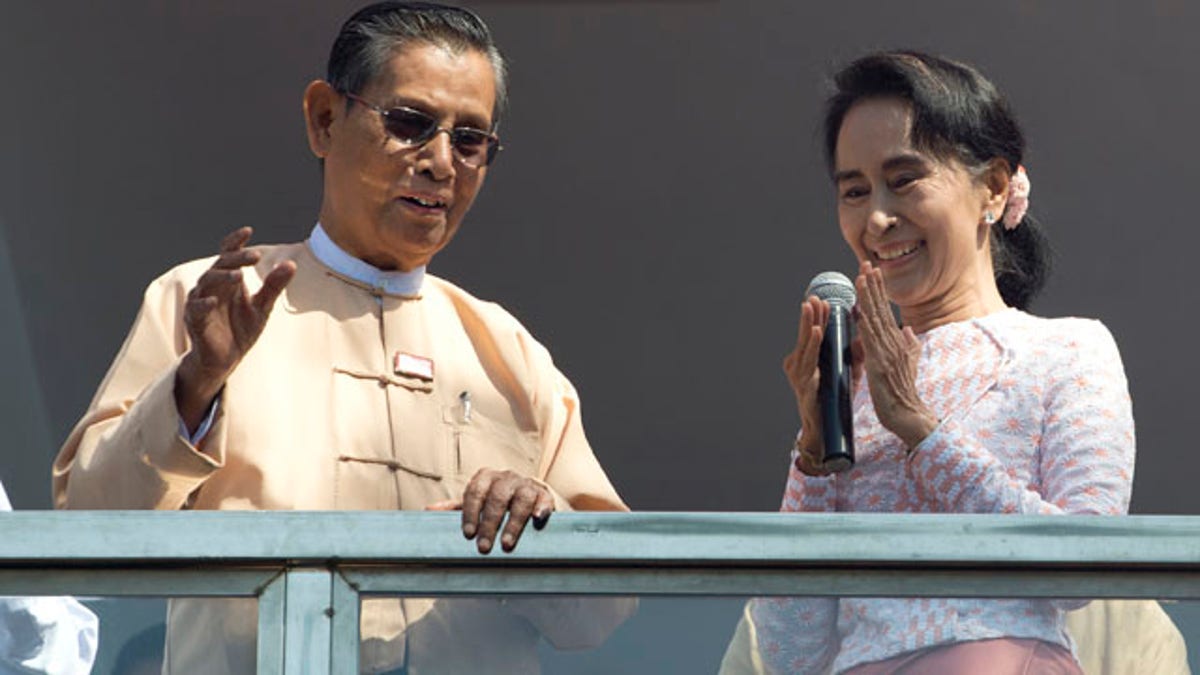
Nov. 9, 2015: Aung San Suu Kyi, the leader of Burma's National League for Democracy party, delivers a speech with party patron Tin Oo from a balcony of her party's headquarters in Yangon. (AP Photo/Mark Baker)
The chairman of Burma's ruling party conceded defeat in the country's first free general election in 25 years Monday.
"We have to find out the reason why we lost," Htay Oo, the leader of the Union Solidarity and Development Party (USDP), told Reuters: "However, we do accept the results without any reservations."
His comments appear to support earlier comments by opposition leader Aung San Suu Kyi in which she hinted at a victory for her party, the National League for Democracy (NLD). An NLD spokesman told Sky News the party had secured more than 80% of the votes counted so far in densely populated central regions.
However, voting is still under way and no results have been announced by officials. The government election commission was expected to start announcing final results Monday evening and go on through the night into Tuesday. The NLD has been widely expected to finish with the largest number of seats in Parliament.
In a speech at the NLD headquarters, Suu Kyi said: "It is still a bit early to congratulate our candidates who will be the winners."
She added: "I want to remind you all that even candidates who didn't win have to accept the winners but it is important not to provoke the candidates who didn't win to make them feel bad."
The NLD had thousands of monitors deployed across Burma during the vote, keeping track as each polling station closed and publicly announced its totals. That was expected to give NLD leaders a solid estimate of final numbers long before official totals were announced.
Win Htein, the NLD spokesman, told The Associated Press that the party's strongest showing is in the heartland states, where it appears to be garnering 80 percent of the votes. The support falls off slightly to 70-50 percent in the ethnic states.OK
"DAWN OF A NEW ERA. Millions vote in historic election," was the banner headline Monday of the New Light of Myanmar, a government-owned newspaper and long a mouthpiece for ruling juntas.
The vote was billed as the freest ever in this Southeast Asian nation, which has been run by a quasi-civilian government for the last five years in a scripted transition toward democracy. Many of the eligible 30 million voters cast ballots for the first time, including Suu Kyi, widely revered as the embodiment of the country's dreams for democratic reform.
"I am so happy and I am not the only person, the whole country is happy. I think she is a perfect leader for our country and a woman of perfection," said 71-year-old Khin Maung Htay, who was listening to Suu Kyi's speech.
He said he hoped the government would accept a loss because they have "already promised us that they will accept whatever the result is."
Although 91 parties fielded candidates on Sunday, the main fight was between the NLD and USDP, which is made up largely of former junta members. A host of other parties from ethnic minorities, who form 40 percent of Burma's 52 million people, are also running.
The election, though, was not without problems. Observers criticized the government for keeping about 500,000 eligible voters from the country's 1.3 million-strong Rohingya Muslim minority from voting. The government considers them foreigners, though many have lived in the country for generations. Neither the NLD nor the USDP fielded a Muslim candidate.
No matter the results, the election will not create a fully democratic Burma, since the constitution reserves 25 percent of parliamentary seats for the military, and was rewritten to keep Suu Kyi, overwhelmingly the country's most popular politician, from the presidency.
She cannot run for president or vice president because a constitutional amendment bars anyone with a foreign spouse or child from holding those positions. Suu Kyi's two sons are British, as was her late husband.
Suu Kyi, however, has said she will act as the country's leader if the NLD wins the presidency, saying she will be "above the president."
The junta, which seized power in a 1962 coup, annulled the results when Suu Kyi's party won a sweeping victory in 1990 elections. A new vote was held in 2010, but the opposition boycotted it saying the election laws were unfair.
The USDP won by default and took office in 2011 under President Thein Sein, a former general who began political and economic reforms to end Burma's isolation and jump-start its moribund economy. But the USDP was battered in a 2012 by-election in which the National League for Democracy won 43 of the 44 parliamentary seats it contested.
After the elections, the new members of parliament and the military appointees will propose three candidates, and then elect one as president. The other two will become vice presidents.
The Associated Press contributed to this report.
